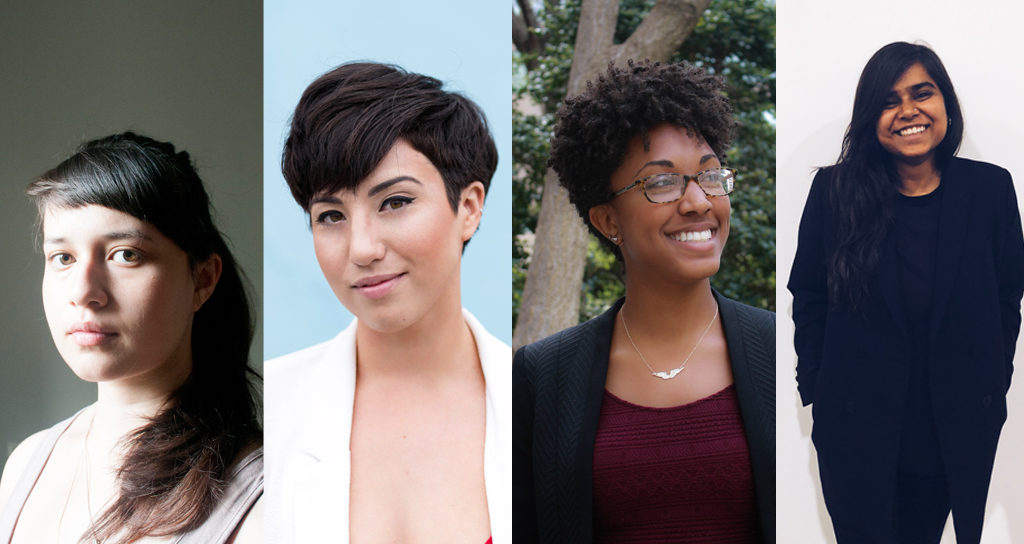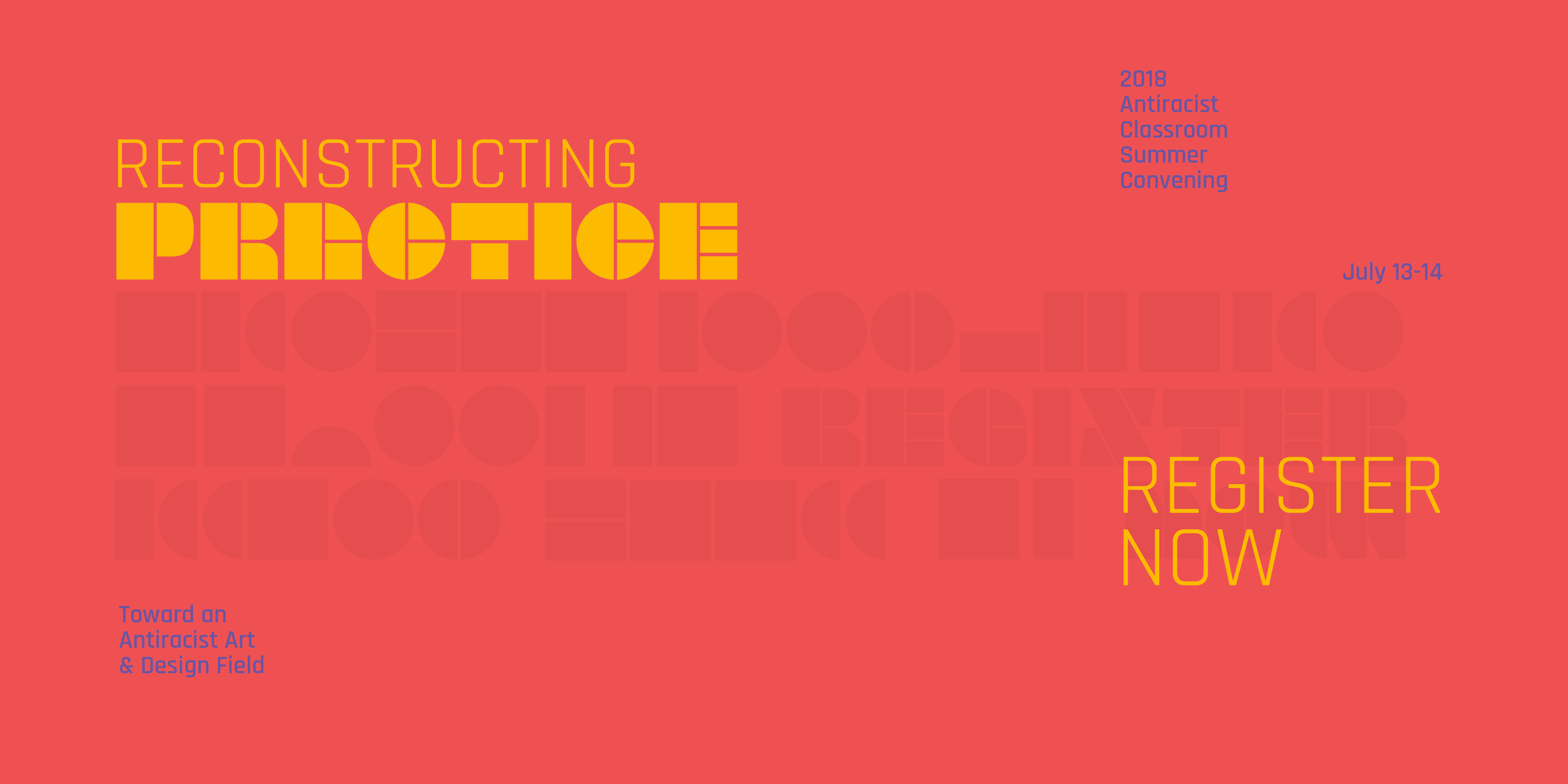On July 13th and 14th, The Antiracist Classroom, a student-led organization at the ArtCenter College of Design, will host a two day convening called Reconstructing Practice.
Designmatters sat down with The Antiracist Classroom Co-founders and convening organizers Godiva Veliganilao Reisenbichler, Bianca Nozaki-Nasser and Lauren Williams to learn about the upcoming event.
Click here to register for Reconstructing Practice before June 22!
DM: What is Reconstructing Practice Toward an Antiracist Art & Design Field?
Reconstructing Practice is a two-day convening of artists, designers, technologists, educators, students, professionals, and more. There will be sessions where speakers and participants share their work and reflections; generative workshops; interactive installations; a gallery of featured works of art and design; and plenty of socializing. Our goal is to provide a series of opportunities for young creators—of color, especially—to engage with and through art, design, media and/or technology. More importantly, this event gives folks working against, within, and around racist structures, histories, and experiences a chance to showcase their work, get feedback on their work, and produce new work together. Reconstructing Practice seeks to highlight work and creators that offer new, different, and important ways of considering, creating, or encouraging an anti-racist art and design field.
DM: Why is this event important/needed for the ArtCenter community and for the world?
This event is part of a body of a work responding to students who had either been victim or witness to an institution built on white supremacy. We realized that anti-racism as a practice in itself could—and needs to—redefine and reshape what art and design practices look like at a larger scale.
DM: What are each of your roles for this project and how are you working together to bring this important event to ArtCenter?
Lauren is leading the programmatic direction, strategy, and overall management of the convening. This ranges from defining the overarching themes that would shape the types of submissions we received through our open call, to curating the sessions and working with facilitators to arrive at a cohesive program, to navigating relationships with funders. In all these endeavors we’re seeking a delicate balance: trying to create a space and experience that privileges and lifts up the narratives, contributions, and realities of creators of color while credibly confronting and, at times, partnering with, the institution we’re critiquing.
Godiva has taken on the role of the spatial experience designer. We’re bringing a number of people to ArtCenter for the first time and exhibiting the work of artists, designers, and technologists from around the world, so our mission is to create an inviting and accommodating space where people can connect to others who are doing similar work, or forging similar practice.
Bianca is handling communications, outreach, and content development. Our goal is invite communities inside and outside of ArtCenter to participate, in addition to making sure we connect our speakers, participants, guests and organizations to one another before, during, and after the convening. Nidhi Singh Rathore is directing the development of the event’s visual identity, finding ways to express our thematic directions visually and materially.
Over the last few months we’ve worked closely together to shape the vision and goals for the convening. Throughout, we have had the support of our Committee Members: Bryan Ortega, ArtCenter 2018 Fine Art graduate; Allegra Padilla, Coordinator of Community Programs at Occidental College; faculty advisors, Arden Stern, ArtCenter Humanities & Sciences and Media Design Practices; Esther Pearl Watson, ArtCenter Illustration; and Everard Williams, ArtCenter Photography.
DM: How does this build on or complement the work you are doing with ARC?
Throughout the last year, we hosted a range of events: from informal open forums where students could vent about their experiences and connect with others; to our Call for Posters through which we invited work, curated an exhibit, and facilitated a discussion that explored the theme of racial microaggressions. This event builds on those initiatives by inviting people from around the world—and from a range of different institutions—to contribute outside perspective to the conversation about race and racism at ArtCenter in ways that will enrich our understanding of our own experience. It also begins to center these questions and concerns we’ve raised in a dialogue about pedagogical design, institutional change, research, and practice in ways that lend credibility and significance to a conversation that’s too often either ignored or euphemized.

(from lft to rt) Godiva Veliganilao Reisenbichler, Bianca Nozaki-Nasser, Lauren Williams and Nidhi Singh Rathore
DM: What is the overarching idea behind the convening and what do you hope to accomplish?
With this event we aim to center the experience, perspective and work of folks working against, within, and around racist structures, histories, and experiences. By creating formal space to view, discuss, and produce intentionally anti-racist work we are attempting to foster and support communities who are committed to developing anti-racist futures. Our three themes sum it up best:
1. Take up space: Occupy physical and virtual space that provoke dialogue, challenge the norm and inspire views of race and equity that we don’t typically encounter in our fields.
2. Construct a counter-canon: Equip more artists / designers of color [and become equipped themselves] to produce and document art, design, media, technology and writing that contributes to a counter canon or forces the prevailing canon to shift.
3. Imagine and manifest alternatives: Experiment with and model ways that institutions (colleges, design firms, governments, and more) might consider transforming their curriculum, policies, and programming to construct a more inclusive, equitable, critical, or representative reality.
DM: What is/was your process for curating the speakers and tailoring the event to tackle the ideas presented in the previous answer?
For us, the open call for ideas served as a form of research, in and of itself. We weren’t sure who else was doing this kind of work or how it was showing up at other institutions. We didn’t know if it was happening in classrooms, board rooms, or in student-led initiatives like our own.
While we started by laying out some broad themes as guardrails, our hope was that the submissions of art, design, technology, and sessions we received would shape both the nature of the event and our understanding of the field. After receiving over 30 responses from as close as our own ArtCenter studios and as far as Thailand, we vetted them through the lenses of our three themes and sought out topical threads that held them all together in a cohesive way. We quickly found that most of the strong submissions were tied in some way to art and design in higher education, and began to curate the program with that in mind.
In our open call for ideas, we welcomed any and all mediums of practice including: physical artwork, research projects or papers, co-facilitation of a discussion, feedback on a works-in-progress, highlighted sites, organization-led initiatives, individually-produced events, and any skill or topic exploration that people wanted to learn more about that would take their research or racial justice practice to the next level. The field of practice of each submission—as long as it fell into some aspect of art, design and/or technology—was less important than the idea’s relevance to at least one of the convening’s three thematic areas.
DM: What do you hope your attendees and presenters take away from this experience?
We want people to leave with concrete ways of working, inspiration, new and strengthened relationships, and energy to keep doing the work they’re doing in the context of institutions that don’t always support them but rely on them to function. We want the experience to resonate in ways that extend its impact beyond the two days we have together in Pasadena. Being able to partake in this kind of convening and fellowship is something that can and should happen more than once—not to say that Antiracist Classroom needs to be the anchor for this kind of event in the future—but that our event can serve as a model for bringing creators of color together in the future, across many different contexts.
Lastly, we want participants to feel affirmed and supported in their actively anti-racist creative and professional practices. We also want our secondary audiences, especially institutional decision makers who hold power and privilege, to understand that their decisions and indecisions incrementally shape institutional culture every day. If we are not creating institutional policies and culture that are anti-racist, we are actively creating culture that fails students of color.
DM: What are your plans if any, to expand the convening to other places of higher learning?
The convening has already drawn facilitators, artists, and designers from institutions across the world: The School of Visual Arts, Parsons, UCONN, Central Saint Martins, Redlands University, Massachusetts College of Art and Design, and more. The planning process has made it clear that there are efforts underway at many other art and design institutions that precede our own and may very well last longer than our own: extending this event beyond ArtCenter is really about finding ways to extend the relationships and exchanges that grow out of this event in ways that will last longer than our tenure as students or at any one particular institution.
DM: Any final thoughts to add?
We are looking forward to hosting a vibrant and impressive group of creatives from all over the world! Stay tuned for more about the specifics: we’ll be sharing updates about featured facilitators and artists over the next month or so. Registration to join us at Reconstructing Practice on July 13th and 14th is now open. Get your tickets now before registration closes June 22nd!
